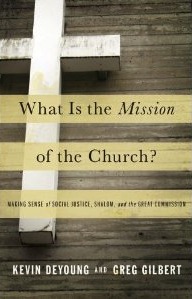 In this post on Kevin DeYoung and Greg Gilbert’s book I want to reflect on chapter 8, “Seeking Shalom: Understanding the New Heavens and the New Earth”. While I don’t think I’d come out much different from them in conclusion—they advocate a “faithful presence” a la James Davidson Hunter, I think there are at least two weaknesses in the discussion.
In this post on Kevin DeYoung and Greg Gilbert’s book I want to reflect on chapter 8, “Seeking Shalom: Understanding the New Heavens and the New Earth”. While I don’t think I’d come out much different from them in conclusion—they advocate a “faithful presence” a la James Davidson Hunter, I think there are at least two weaknesses in the discussion.
DeYoung and Gilbert’s major assertion in the chapter is the responsibility of bringing into existence the new creation is God’s and Jesus’, as the new Adam, and, therefore, is not ours. They critique evangelical views that suggest that Christians have a role in bringing about New Creation – singling out specifically Gabe Lyons.
Internal to this argument is assertion that the so-called cultural mandate given to Adam was rendered impossible by the fall. And only with Jesus, the second Adam (Rom 5), does Adam’s mandate come to its completion; and, as Jesus’, again it is not ours in any sense.
Finally, they note the ambivalence in Scripture in regard to the question of continuity and discontinuity between the old heaven and earth and the new.
The major weakness in their argument is the absence of Israel and David in the discussion of God’s redemption story in reference to the cultural mandate. They, like so many others, completely ignore three-fourths of the Bible’s story by inappropriately jumping from Adam to Jesus, completely skipping Israel and David as antecedent elements of an Adam Christology. While they acknowledge the ongoing story with a single reference to the role of the Levitical priests as “workers” and “keepers” of the tabernacle/temple, they have no appreciation of the relationship between Israel, David and Jesus.
It is not possible to fully develop it here, but it is quite clear that Israel in the Promise Land too represented a new Adam. Israel was given the Promised Land as a gift (as the Eden to Adam) and commanded to subdue it (as Adam was). However, (like Adam) they failed in their “cultural”, vocational mandate. This mandate was then transferred for all of Israel to their kingly representative. With the Davidic covenant, Israel’s vocation was inextricably linked to the Davidic king. David became God’s new Adam as Israel’s representative. David and Solomon go far in fulfilling their mandate. In fact, if you look at the borders of their kingdom at its zenith, they take more of the land that was promised to Abraham than at any other time in Israel’s history; but still they don’t subdue the whole land of Promise.
What’s more, David and Solomon fail to be faithful to God. Israel’s kingship, while developing and furthering the Story, does not succeed bringing to completion the cultural mandate. Yet Davidic kingship is now unalterably the shape of the Story, and will lead to the coming Messiah. The prophets foresaw a day when God would renew the earth. He would bring about a new creation (Isa 65-66); he would rebuild the “fallen tent of David” (Amos 9) and install a new Davidic king over a restored Israel in a restored, sin-free creation (Ezek 34-37). Jesus is that predicted new Son of David. Jesus is therefore the new Adam.
Get this right the. Paul doesn’t skip over Israel to Adam. Jesus is the new Adam precisely because he’s the Davidic messiah, because Jesus is the Davidic messiah of Israel, because Jesus is the Davidic messiah of Israel that resets the fallen Adam and completes the cultural mandate. Israel doesn’t get side stepped in the argument. Israel and its Davidic king are the structure of the mandate.
The second weakness is the lack of clarity on the question of who is the “us” and “our” in the call to faithful presence. Consider this statement:
No, our task, as it has always been for the people of God, is to live in this passage age with simple faithfulness. We are to strive for a “faithful presence” in a fallen world.
My question: whose task is this? Mine as an individual or ours as a church body? If the latter, then it seems that faithful presence is at the core of our Christian identity and therefore at the core of our mission as corporate body of Messiah.
Which leads me to on final point. If we are the corporate body of Messiah, then why wouldn’t it follow that together as the body of Messiah we would not have the cultural mandate that he has? Can someone tell me why we would not, by extension, have the mandate that Jesus does? Isn’t it the case that in him we are also the “image” of God as we are formed by His Spirit (Rom 8; Col 1-2)?











